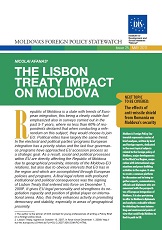The Lisbon Treaty Impact on Moldova
The Lisbon Treaty Impact on Moldova
Author(s): Nicolai Afanas
Subject(s): International relations/trade, EU-Approach / EU-Accession / EU-Development
Published by: IDIS VIITORUL Institutul pentru Dezoltare şi Initiative Sociale
Summary/Abstract: Republic of Moldova is a state with trends of European integration, this being a clearly visible fact emphasized also in surveys carried out in the past 5-7 years, where no less than 60% of respondents declared that when conducting a referendum on this subject, they would choose to join EU. Political elites have largely the same trend. In the electoral and political parties’ programs European integration has a priority status and the last four governance programs have approached EU accession process as a strategic goal. As a result, social and political processes within EU are directly affecting the Republic of Moldova due to geographical proximity, intensity of the Moldova-EU relations, but also due to obvious interests that EU has in the region and which are accomplished through European policies and programs. A final legal reform with profound institutional and political consequences was the signing of Lisbon Treaty that entered into force on December 1, 2009. It gives EU legal personality and strengthens its negotiation capacity and position of global player on international arena. Also, this treaty enhances activity in promoting democracy and stability, especially in areas of geographical proximity.
Series: Moldova’s Foreign Policy Statewatch
- Page Count: 3
- Publication Year: 2011
- Language: English
- Content File-PDF

